| Listing 1 - 10 of 21 | << page >> |
Sort by
|
Book
ISSN: 02966948 ISBN: 2729115242 9782729115241 Year: 2004 Volume: 36
Abstract | Keywords | Export | Availability | Bookmark
 Loading...
Loading...Choose an application
- Reference Manager
- EndNote
- RefWorks (Direct export to RefWorks)
Filosofie [Moderne ] --- Historicism --- Historicisme --- Historisme --- Philosophie moderne --- Philosophy [Modern ] --- Philosophy --- History --- Philosophy and History --- Philosophy - History
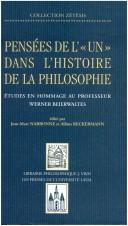
ISBN: 9782711643257 9782763779676 2711643255 2763779670 Year: 2004 Publisher: Paris : Québec : Libr. philosophique J. Vrin ; Presses de l'Université Laval,
Abstract | Keywords | Export | Availability | Bookmark
 Loading...
Loading...Choose an application
- Reference Manager
- EndNote
- RefWorks (Direct export to RefWorks)
La notion d'«unité» est, avec celle de l'«être», du «bien» et du «beau», l'une des plus déterminantes de l'histoire de la philosophie et trouve sa place autant dans la pensée ancienne que dans la philosophie moderne. Les néoplatoniciens, tout spécialement, en ont fait la source et le principe explicatif de toute la réalité, à la fois au-delà de l'être, de la pensée et du discours. Les contributions qu'on lira ici, rassemblées sous ce thème, veulent rendre hommage à la recherche foisonnante mais elle-même inspirée et pour ainsi dire "unifiée" par l'idée de l'Un, du professeur Werner Beierwaltes, dont les études sur Plotin, Proclus, Jean Scot Érigène, Nicolas de Cues, Schelling, Hegel et Heideger, ont marqué la recherche contemporaine.
One (The One in philosophy) --- Ontology --- Philosophy - History --- Un (philosophie) --- Philosophy --- History --- Ontology. --- History. --- Beierwaltes, Werner
Book
ISSN: 09816690 ISBN: 2204073296 9782204073295 Year: 2004 Publisher: Paris : Éditions du Cerf,
Abstract | Keywords | Export | Availability | Bookmark
 Loading...
Loading...Choose an application
- Reference Manager
- EndNote
- RefWorks (Direct export to RefWorks)
Communities --- Communauté --- Philosophy --- Philosophie --- Political science --- Social ethics --- History --- Communauté --- Political science - Philosophy - History --- Social ethics - History
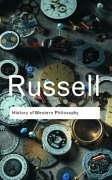
ISBN: 0415325056 9780415325059 9780203487976 9781134343621 9781134343669 9781134343676 9781138127043 Year: 2004 Publisher: London : Routledge,
Abstract | Keywords | Export | Availability | Bookmark
 Loading...
Loading...Choose an application
- Reference Manager
- EndNote
- RefWorks (Direct export to RefWorks)
Philosophy --- Histoire de la philosophie occidentale --- --Political science --- History --- Western influences --- History. --- Philosophy - History --- Political science - Western influences --- Political science
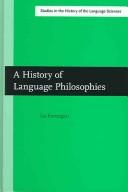
ISBN: 9027245959 9027245967 1588115615 9789027245960 1588115607 9786612160196 1282160192 9027295077 9781588115614 9789027295071 9781588115607 9789027245953 Year: 2004 Volume: 105 Publisher: Amsterdam Benjamins
Abstract | Keywords | Export | Availability | Bookmark
 Loading...
Loading...Choose an application
- Reference Manager
- EndNote
- RefWorks (Direct export to RefWorks)
Theory and history combine in this book to form a coherent narrative of the debates on language and languages in the Western world, from ancient classic philosophy to the present, with a final glance at on-going discussions on language as a cognitive tool, on its bodily roots and philogenetic role.An introductory chapter reviews the epistemological areas that converge into, or contribute to, language philosophy, and discusses their methods, relations, and goals. In this context, the status of language philosophy is discussed in its relation to the sciences and the arts of language. Each chapter is followed by a list of suggested readings that refer the reader to the final bibliography.About the author: Lia Formigari, Professor Emeritus at University of Rome, La Sapienza. Her publications include: Language and Experience in XVIIth-century British Philosophy. Amsterdam & Philadelphia: J. Benjamins, 1988; Signs, Science and Politics. Philosophies of Language in Europe 1700-1830. Amsterdam & Philadelphia: J. Benjamins, 1993; La sémiotique empiriste face au kantisme. Liège: Mardaga, 1994.
Language and languages --- Philosophy --- History --- Langage et langues --- Philosophie --- Histoire --- LANGUAGE ARTS & DISCIPLINES --- Linguistics / General --- Philology & Linguistics --- Languages & Literatures --- Language and languages - Philosophy - History --- Linguistics --- History.
Book
ISBN: 1474475353 1474475345 1474475329 Year: 2004 Publisher: Edinburgh, Scotland : Edinburgh University Press Ltd,
Abstract | Keywords | Export | Availability | Bookmark
 Loading...
Loading...Choose an application
- Reference Manager
- EndNote
- RefWorks (Direct export to RefWorks)
This book collects twelve previously untranslated lectures by Castoriadis from 1982 to 1983. Castoriadis focuses on the interconnection between philosophy and democracy and the way both emerge within a self-critical imaginary already in development in the work of early Greek poets and Presocratic philosophers.
Displaying both mastery of the relevant scholarship and original interpretation, he reveals the birth of a society that would place its highest value in calling itself and its institutions into question? He argues that this spirit would develop directly into the twin signatures of the Greek world, namely radical philosophy, on the one hand, and radical democratic practices, on the other.
Like no previous interpreter, Castoriadis allows us to feel the existential need, already present in the earliest Greek thinkers, to question the significance of human existence and to share in shaping its meaning. The Greeks not only did this, he argues, they also began the equally important work of establishing the institutions to support such a project.
Democracy in literature. --- Democracy --- Mythology, Greek. --- Philosophy, Ancient. --- Poetry, Ancient --- Political science --- Philosophy. --- History and criticism. --- History. --- PHILOSOPHY / History & Surveys / Ancient & Classical. --- Greece --- Civilization --- To 146 B.C.
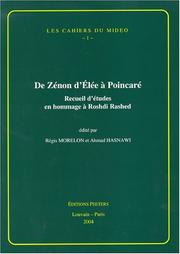
ISBN: 9042914955 2877238075 9789042914957 Year: 2004 Volume: 1 Publisher: Louvain Peeters
Abstract | Keywords | Export | Availability | Bookmark
 Loading...
Loading...Choose an application
- Reference Manager
- EndNote
- RefWorks (Direct export to RefWorks)
Geschiedenis van de wetenschappen --- Histoire des sciences --- Huldeboeken --- Mélanges --- Rashed, Roshdi --- Science --- Mathematics --- Philosophy --- Mathematics, Arab --- History --- Philosophy. --- Mathematics, Arab. --- History. --- Natural science --- Science of science --- Sciences --- Mental philosophy --- Humanities --- Math --- Arab mathematics --- Mathematics, Arabic --- Philosophy&delete& --- Natural sciences --- Science - Philosophy - History --- Science - History --- Mathematics - Philosophy - History --- Mathematics - History
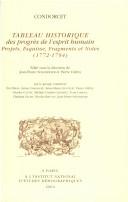
ISSN: 16226267 ISBN: 2733210297 9782733210291 Year: 2004 Volume: *2 Publisher: Paris Institut national d'études démographiques
Abstract | Keywords | Export | Availability | Bookmark
 Loading...
Loading...Choose an application
- Reference Manager
- EndNote
- RefWorks (Direct export to RefWorks)
History of philosophy --- Philosophy --- Civilization --- Philosophie --- Civilisation --- History --- Histoire --- Philosophy - History --- Civilization - History --- CONDORCET (JEAN ANTOINE NICOLAS CARITAT DE), 1743-1794 --- SCIENCES --- ET L'ECONOMIE POLITIQUE --- CONTRIBUTION A LA PHILOSOPHIE DE L'HISTOIRE --- HISTOIRE --- EVOLUTION
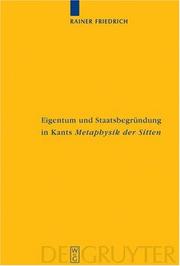
ISBN: 3110181665 3110926296 9783110181661 Year: 2004 Volume: 146
Abstract | Keywords | Export | Availability | Bookmark
 Loading...
Loading...Choose an application
- Reference Manager
- EndNote
- RefWorks (Direct export to RefWorks)
Im Gegensatz zu gängigen Interpretationen der Kant'schen Rechtslehre zeigt Rainer Friedrich, dass Kant die Notwendigkeit eines öffentlich-rechtlichen Zustandes nicht aus dem natürlichen Eigentumsrecht ableitet. Stattdessen bildet allein das angeborene Menschenrecht der Freiheit die subjektiv-rechtliche Grundlage des Staates. Die textnahe Analyse zieht neben den Vorarbeiten zur Rechts- und Tugendlehre sowie Kants einschlägigen Vorlesungen auch zeitgenössische Kommentare heran. Schwerpunkte der Untersuchung bilden die der Rechtslehre zugrunde liegende Pflichtensystematik, Kants Lehre der subjektiven Rechte, die Lehre der ursprünglichen Erwerbung und die Bedeutung des allgemeinen Willens für das Privatrecht sowie der Übergang vom Privatrecht zum öffentlichen Recht. Rainer Friedrich legt eine kohärente, historisch und systematisch angelegte, Rekonstruktion von Kants Vernunftrecht vor. Unlike conventional interpretations of Kant's Rechtslehre, Rainer Friedrich demonstrates that Kant does not derive the necessity of a state of public law from natural property law. Rather, the innate human right of liberty forms the subjective legal basis of the state. The close textual analysis both consults the preparatory studies to the doctrine of law and virtue and Kant's relevant lectures and considers contemporary commentaries. The study emphasizes the systematicity of duty underlying the Rechtslehre, Kant's doctrine of subjective rights, the doctrine of original acquisition and the significance of the general will for private law, together with the transition from private to public law. Rainer Friedrich provides a coherent historically and systematically arranged reconstruction of Kant's rationality of law.
Kant, Immanuel --- Criticism and interpretation --- Property --- Philosophy --- State [The ] --- Origin --- Kant, Immanuel, --- Kant, Immanuel. --- Kant, Immanuel: Die Metaphysik der Sitten. --- Rechtsphilosophie. --- Vernunftrecht. --- Rechtsphilosophie --- PHILOSOPHY / History & Surveys / General. --- Philosophie --- Rechtswissenschaft --- Rechtslehre
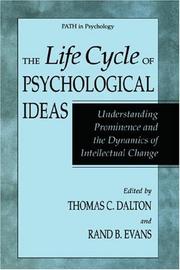
ISBN: 0306479982 9786610147649 1280147644 0306480107 Year: 2004 Publisher: New York : Kluwer Academic/Plenum,
Abstract | Keywords | Export | Availability | Bookmark
 Loading...
Loading...Choose an application
- Reference Manager
- EndNote
- RefWorks (Direct export to RefWorks)
This book focuses on what other volumes have only touched on, that is the factors that contribute to the rise of certain persons and ideas in the field of psychology. Bringing together noted experts in the field, it describes the process of intellectual reconstructions that determines how we view historical events, and why some ideas die only to be reborn again, as well as why new ideas can quickly topple traditional views.
Psychology - Philosophy - History. --- Psychology --- Psychological Theory --- History, 20th Century --- History, Modern 1601 --- -Psychological Phenomena and Processes --- Behavioral Sciences --- History --- Psychiatry and Psychology --- Behavioral Disciplines and Activities --- Humanities --- Social Sciences --- Philosophy --- History.
| Listing 1 - 10 of 21 | << page >> |
Sort by
|

 Search
Search Feedback
Feedback About UniCat
About UniCat  Help
Help News
News